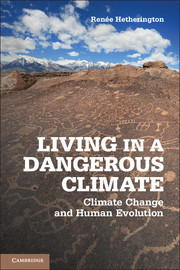Book contents
- Frontmatter
- Contents
- Figures
- Tables
- Foreword: Evolution and the Human Condition
- Acknowledgments
- Preface
- Earth’s Climate
- The Evolution of the Homo Species
- 2 The Cradle of Humankind
- 3 The Neanderthal Enigma
- 4 The End of Homo Diversity
- Climate and Human Migration
- Climate and Agriculture
- The Dominant Paradigm
- Today and Tomorrow
- The Economic Connection
- Dangerous Attitudes
- Living in Dangerous Times
- Glossary
- Notes
- Index
2 - The Cradle of Humankind
Published online by Cambridge University Press: 05 June 2012
- Frontmatter
- Contents
- Figures
- Tables
- Foreword: Evolution and the Human Condition
- Acknowledgments
- Preface
- Earth’s Climate
- The Evolution of the Homo Species
- 2 The Cradle of Humankind
- 3 The Neanderthal Enigma
- 4 The End of Homo Diversity
- Climate and Human Migration
- Climate and Agriculture
- The Dominant Paradigm
- Today and Tomorrow
- The Economic Connection
- Dangerous Attitudes
- Living in Dangerous Times
- Glossary
- Notes
- Index
Summary
Endless forms
most beautiful and most wonderful have been,
and are being evolved.
Charles Darwin (1809–82), On the Origin of SpeciesOne day, as the story of the first human emergence might go, an early human ancestor stood upright amid the grasslands of the African savanna and staggered a few steps before tumbling among her astonished playmates. A game ensued as they all began to balance on their hind legs and poke their tiny apelike heads above the tall grass. At one point when the original curious one began to fall, a gallant young male reached out and took her hand. Soon the two were leaning against each other, chuckling and tottering away.
It was not long after that a group of our early ancestors came upon a recently killed carcass. They were chattering away in their guttural language as they ripped open the hide and stuffed meat into their mouths. They pushed each other aside, vying for a chance to tear meat off the bones; a food fight ensued. Meat, blood, and bones flew through the air. One rambunctious adolescent, who had just been whacked in the head with a bone, turned and heaved the closest thing at hand, a cobble. It narrowly missed the aggressor, crashed into another rock, shattered, and ricocheted through the air. A large splinter of rock lodged in the aggressor’s leg. The food fight abruptly halted. They looked on in amazement as blood began to pour out of the large gash. Bending over, the adolescent pulled out the piece of rock, but instead of throwing it away as one might expect, he looked from the bloodied rock in his hand to the carcass and back. Bending over the carcass, he ran the sharp edge of the broken rock along the hide. To the astonishment of his friends, a chunk of meat slipped neatly to the ground. Silence, and then another frenzy of excitement ensued. Rocks began flying in all directions as each tried to make their own broken rock chunks to hive meat from the rapidly depleting carcass.
- Type
- Chapter
- Information
- Living in a Dangerous ClimateClimate Change and Human Evolution, pp. 23 - 35Publisher: Cambridge University PressPrint publication year: 2012



